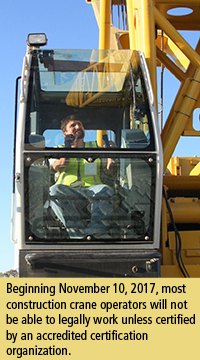Certification will be mandatory for most crane operators from November 10, 2017
May 2017—Are you ready for November 2017? If you replied “yes,” read no further. If you have no idea what that question means (or, at least, are not sure), and you are a crane operator, or employ crane operators, this story is for you.
 A half-dozen years or so ago, OSHA published the most far-reaching requirements in U.S. history for the way cranes are used in construction. More than 95 percent of that rule has been in place since that time. The only hold-out? The requirement for operators to be certified. The industry was given four years from the publication of the rule to get ready for this ground-breaking provision. OSHA then extended that deadline by three years when the industry requested certain changes.
A half-dozen years or so ago, OSHA published the most far-reaching requirements in U.S. history for the way cranes are used in construction. More than 95 percent of that rule has been in place since that time. The only hold-out? The requirement for operators to be certified. The industry was given four years from the publication of the rule to get ready for this ground-breaking provision. OSHA then extended that deadline by three years when the industry requested certain changes.
That takes us to, well, November this year. November 10 to be exact. What does this mean? From that date, if you are a crane operator you cannot legally work in construction in the United States unless you are certified by an accredited certification organization. While there are some exceptions (cranes of 2,000 lb. rated capacity and below, as well as certain equipment, for example) it’s vitally important that, if you have not begun the process, you start now.
Here’s why:
- You’ll need to pass both written and practical exams to be certified. If you run more than one type of crane, you’ll likely need to take additional exams. Certification doesn’t happen “overnight.”
- You’ll need to schedule exams. Even though computer-based testing is available for written exams, due to equipment availability, scheduling a practical test may require more lead time.
- You need to allow time for the testing organization to score your exams and, if you passed, issue certification cards.
- You may not pass the first time, so you need to allow time to schedule re-testing.
- You should consider pre-exam training. That will add to the “upfront” time required of the whole certification process.
So, don’t delay! Follow the Quick Links at the top of this page to locate your crane type and to schedule your tests. Email twhittington@nccco.org with any specific questions or concerns.
CCO Operator Certifications Available:
- Lattice Boom Truck Cranes
- Lattice Boom Crawler Cranes
- Telescopic Boom Cranes—Swing Cab
- Telescopic Boom Cranes—Fixed Cab
- Service Truck Cranes
- Boom Trucks
- Tower Cranes
- Overhead Cranes
- Articulating Cranes (Knucklebooms)
- Digger Derricks
- Dedicated Pile Drivers
- Foundation Drill Rigs (in development)
 In order to provide OSHA-recognized operator certifications under the new rule, certification bodies must be accredited by a nationally recognized accrediting organization. CCO certification programs are accredited by the foremost accrediting agency in the country—ANSI—whose accrediting system also follows the requirements of the international standard ISO 17024.
In order to provide OSHA-recognized operator certifications under the new rule, certification bodies must be accredited by a nationally recognized accrediting organization. CCO certification programs are accredited by the foremost accrediting agency in the country—ANSI—whose accrediting system also follows the requirements of the international standard ISO 17024.
What’s Your Type?
Not sure which category the crane you operate falls into? Email the CCO Crane Type Hotline at cranetype@nccco.org.
NCCCO has the widest range of certifications available in the crane industry but where no specific certification exists for a particular type of crane, it may not be clear which certification applies—which is why NCCCO has formed the Crane Type Advisory Group (CTAG). This panel of crane experts, composed of representatives of the leading crane manufacturers, users and operators, is conducting the most comprehensive review of crane types ever undertaken as a public service to educate employers about how to fulfill their obligations under the new rule.
All decisions are added to the NCCCO Crane Type Database, the industry’s most comprehensive authority on crane types and available at http://www.ncccofoundation.org/most-similar/.
For additional history on OSHA’s Crane Rule, see NCCCO’s OSHA Crane Rule Resource Center.